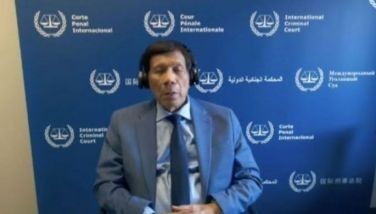Tortured

What a violent society we have.
Amorous visitors are beaten black and blue and their family jewels smashed – with one beating even recorded on video and shown around by the proud perpetrator.
Cops who must be bored with their job and with no outlet for creativity develop a crude “wheel of torture†for interrogating crime suspects. The less innovative are recorded on a camera phone beating another crime suspect while others stand around watching, a la Abu Ghraib.
A publicist and his driver are kidnapped, tortured, strangled with a length of wire and then burned beyond recognition. Two car dealers suffer similar fates, in separate cases.
Police and military teams, on the lookout for one suspected gambling lord, kill him along with 12 men who happened to be in his convoy in a turkey shoot on the Feast of the Epiphany.
For a nation with a reputation for being friendly and prayerful, why does violence seem to come so easily to certain Pinoys? Violence, occasionally lethal, easily erupts during traffic altercations, and even over monopolizing the microphone in videoke bars.
One proposed explanation is the easy access to guns. But I know many gun enthusiasts who are not violent types. And you need to have the nerve to use a gun against another person. You need a certain mindset to use weapons to inflict harm.
In Catholic school students are taught to respect life starting in grade school, and kids grow up believing that the eternal fires of hell await anyone who takes a life. Violating the commandment against killing cannot be washed away with 10 full recitations of the Rosary or wiping the foot of the Black Nazarene. So in this predominantly Catholic country, it should take a lot of nerve for anyone to kill another human being.
In my years as a crime reporter, I met many cops who did not like using a gun even in self-defense. The only time they were forced to fire a gun was in training, which was why colleagues could tell the marksmen from the “farmers†– those whose bullets always ended up raking the ground, a long way from their target.
Cops also quickly learn who among them are capable of shooting to kill. Or who has a propensity for resorting to violent methods of interrogation.
There’s a long-running debate over the usefulness of various forms of torture in security-related investigation.
The US government under George W. Bush apparently believed torture could be effective in breaking down terrorists. But Washington didn’t want to have its hands directly sullied so it exported terror suspects to friendly countries known to employ torture in interrogation. The practice, called extraordinary or irregular rendition, reportedly continues, although the US now supposedly seeks assurances from the receiving country that torture will not be employed.
* * *
Torture refers not only to directly inflicting physical harm, such as waterboarding and beating, but also to sleep deprivation and psychological scare tactics such as Russian roulette.
A suspect, for example, can be made to stand while a sharpshooter fires at him. Although the shooter does not intend to kill and aims outside the target, the suspect can soil his pants from fright, and spew out vital information.
The most efficient torturers are those who leave no physical marks on their victims. This explains the “popularity†of waterboarding. I’m not sure who learned the method from whom – Americans or Pinoys.
Humiliation tends to elicit anger and defiance so it’s not commonly resorted to. Interrogators who avoid physical violence instead employ psychological warfare, using a carrot-and-stick approach to get what they want from a suspect.
Certain security officers who have served in Mindanao, for example, talk of detaining close relatives of terrorists and bandits to catch the bad guys or make them talk, or force the release of kidnap victims.
Inflicting physical harm tends to have diminishing returns, and may work only on petty criminals who scare easily. Suspects can confess to anything simply to end their suffering. Security officers who sneer at such primitive methods like to say that suspects will confess even to the execution of Jose Rizal just to end the pain.
“Confessions†extracted through such methods can also be withdrawn once the case goes to court and the lawyers are in control.
It’s a lazy, inefficient, unimaginative way of collecting information. The Philippine National Police (PNP) should do more to end the propensity of its members to resort to physical violence in criminal investigation.
PNP officials can start by showing more will to punish human rights violators in their ranks. More than a year after 13 men were massacred in Atimonan, Quezon, no administrative penalties have been imposed on those facing charges. The defender of the cops involved, Panfilo Lacson, is now President Aquino’s coordinator for the rehabilitation of typhoon-devastated areas.
There were few deterrents for the Biñan cops to devise that Wheel of Torture ostensibly to go after drug dealers and illegal gambling operators. Employing torture must be a police disease in Southern Tagalog.
* * *
Another reason why extrajudicial methods of law enforcement persist is, let’s admit it, public support. Ping Lacson did not rise to prominence for being a champion of human rights. Neither did Rodrigo Duterte.
There was no public uproar when suspects in the brutal rape and murder of a six-year-old girl were shot dead while in police custody. There is relatively little public protest when notorious carjackers and kidnappers are killed in alleged firefights with lawmen.
It’s swift justice, unlike the normal turn of the wheels of Philippine justice. Plus taxpayers don’t have to pay for the food and upkeep of arrested thugs.
Civilians tend to take their cue from law enforcers, employing their own creative ways of inflicting physical harm, such as beating to a pulp a man’s phallus – and spreading the video around.
People complain only when someone dear to them becomes the victim of torture and summary execution. That’s when people remember the presumption of innocence, and find the level of violence remarkable in Philippine society.
- Latest
- Trending






























